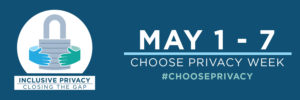Welcome to this week’s Tip of the Hat!
This weekend was hot in Seattle, with temperatures near 90 F. While the Executive Assistant took this time to bask in this heat, we at LDH tried to find a cool spot in the home office to work, away from the Executive Assistant’s gaze.
Last week was a busy week on the Choose Privacy Every Day site for Choose Privacy Week! Here’s what you might have missed:
- Virtual Programming and Patron Privacy – Jaime Eastman along with the ALSC Children and Technology committee give much-needed guidance for library workers who are moving children-oriented programs and services online due to the pandemic. The post goes into the Children’s Online Privacy Protection Act (COPPA), and what library workers need to do to protect the privacy of children while keeping in compliance with COPPA. Bookmark the ALSC Virtual Storytime Services Resource Guide for additional guidance (coming soon!).
- Protecting Privacy In A Pandemic: A Resource Guide – On Friday, May 8th, OIF hosted a Privacy Town Hall about patron privacy. While we wait for the recording of the Town Hall event, the blog post lists the main topics and resources covered by the panelists in the Town Hall.
- When libraries become medical screeners: User health data and library privacy – Some libraries are now giving medical screenings to patrons who want to enter the library building. What privacy risks are there in collecting health data of your patrons? Read the article by LDH to find out why library workers might not be the best choice in handling health data.
Finally, if you have that one library privacy topic that you’ve been meaning to write about or if you want to share your privacy thoughts to a wide audience, Choose Privacy Every Day is looking for blog authors! There are some requirements for being an author for the blog, but this is a great opportunity to get your ideas and thoughts out into the library world.
That’s a wrap! Or, at least, the computer core temperature says it’s time to put the computer in the freezer. If you’re on the West Coast, stay cool, and for those of you who got snow on the East Coast, stay warm!

